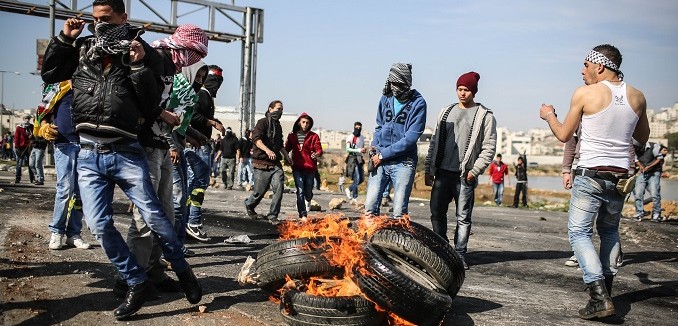One needn’t romanticize this week’s West Bank unrest. It wasn’t exactly a spontaneous outburst of rage – rather, the three funerals held recently were a pre-planned set piece for the stone-throwing that followed.
Near Tulkarem, and in Hebron, two teenagers were laid to rest, having been hit by IDF fire while throwing Molotov cocktails (or according to their friends, stones). Unsurprisingly, their funerals received far less attention from the Palestinian media and public than that of Maysara Abuhamdia, the prisoner who died two days ago in Israel’s Soroka Hospital of terminal esophageal cancer.
Within a month and a half, two prisoners from the Hebron area have died in Israeli prisons. The first, Arafat Jaradat had said he felt ill before collapsing (the Palestinians insist he was tortured), while Abuhamdia’s cancer was apparently discovered too late for treatment.
There will of course be those who claim the recent protests were an authentic expression of frustration over the prisoners. And yet the Palestinian Authority’s accusations of Israeli responsibility for Abuhamdia’s death – and of sundry crimes committed against other prisoners – can be met with a certain suspicion.
First, the Palestinian Education Ministry announced a day after Abuhamdia’s death that across the West Bank, classes would end at 11 a.m. sharp, and that in Hebron, they wouldn’t be held at all. Every Palestinian decision-maker knows the significance those moves: kids of all ages will find themselves unoccupied, listening to the weeping and wailing in Arab and Palestinian media over Israel’s supposed responsibility for the prisoner’s death. The PA’s Ministry for Prisoner Affairs – headed by hardliner Issa Karakeh – has also started taking a more militant line against Israel.
One might think the death of every Palestinian prisoner evokes a wave of protests. But experience tells a different story. In 2007 Shadi Saida – serving eight life sentences for a terror attack near Ramallah – died in an Israeli prison. Saida died from an aggressive infection. Beyond a single PA parliamentarian who blamed Israel for his death by allowing his condition to deteriorate, not a single note of protest was registered. Two years prior, Ghassan Ghanimat died from electrocution caused by a short circuit in his cell. The PA didn’t utter a word of protest.
The Palestinians’ reaction to Abuhamdia’s death has been starkly different, perhaps because he was a general in Fatah’s Preventative Security Forces, which is identified with Fatah, and was also linked by Israel to terror plots organized by Hamas.
This time, the office of PA President Mahmoud Abbas issued a statement placing the blame squarely on Israel.
On one hand, it appears someone in the PA is eager for low-level West Bank unrest to continue. The protests and stone-throwing are spreading.
On the other, Palestinian security forces are thwarting attempted terror attacks against Israel. They look for weapons, detain terror activists, and have lately prevented a number of kidnapping attempts on Israelis.
Ultimately the “controlled chaos” won’t last long, because in the final analysis, popular rage can only backfire and hurt the PA. It bears remembering President Obama’s advice to new Israeli finance minister Yair Lapid on the Ben Gurion tarmac last month: “Be careful what you wish for.”
Abbas and Abdullah
Early this week, Abbas visited Amman. Following his meeting with Jordan’s King Abdullah II, the PA president said the two had signed an agreement reaffirming Jordan’s position as “protector of Al-Haram Al-Sharif,” otherwise known as the Temple Mount.
That pact is likely to raise a number of eyebrows in Israel, Jordan, and the Arab world. Why would Abbas suddenly trek to the Jordanian capital to grant the king authority – even if merely symbolic authority – over the Mount? Is it possible, as Al-Quds Al-Arabi newspaper reported, that the deal is aimed at paving the way for a Jordanian-Palestinian confederation?
The speculation is unrealistic. Palestinian sources gave The Tower another explanation – one slightly more convincing, though not by much. They said Abbas and Abdullah hope to preempt the possibility of Israeli unilateral moves over the Temple Mount, the kind that would change the contested plaza’s status.
If the Palestinian Authority continues its moves toward receiving de facto status as a U.N. member-state, it will in effect wield sovereignty over Arab East Jerusalem. At that point, the sources said, Israel might oust the Palestinian and Jordanian institutions of the Waqf (the Islamic property endowment) from the Mount in a show of sovereignty over it. There are a number of problems with that scenario, but in the Middle East of 2013 one should never say never.
[Photo: Noam Moskovich / The Israel Project]




